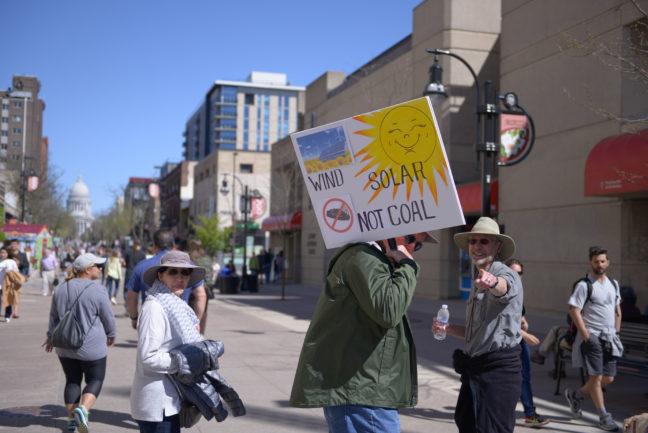350 Madison, a non-profit organization that advocates for climate prevention and social justice issues, hosted a speaker to discuss the intersection of unionized labor and climate change prevention.
The speaker, Kevin Gundlach, president of the South Central Federation of Labor with the AFL-CIO, spoke about how unionized labor will play an important role in the trajectory of climate change and global warming in future years, and how unions are the key to advocacy for all progressive issues.
“If they bust organized labor first, they can go after everything else even more intensely than before,” Gundlach said with regards to those who oppose progressive political issues.
Gundlach said those who are in unions are statistically more likely to be supportive of progressive political issues, which is why he said it is of the utmost importance to preserve and protect unions and their members.
This fact is proven, Gundlach said, by the fact that states with the most union members are also the states that are most supportive of progressive politics.
Coincidentally, Lundbach said, on average, northeastern and northwestern states have the highest union membership and southern states have the least union members, with New York and South Carolina having the highest and lowest membership, respectively.
One of the reasons so many working class people have voted for Republicans in recent Wisconsin elections is because people will always fight for their job over fighting for something abstract, like climate change prevention or finding a sustainable renewable energy source, Gundlach said.
Changes must be made in how climate change prevention is advocated for to remedy this fact, Gundlach said. One of these changes must include finding an environmentally sustainable alternative source of steady employment for workers who are currently employed in highly pollutant industries.
“What we need is not just a transition of energy, but a just transition for these workers,” Gundlach said.
Another change which must be made in how climate change prevention is advocated for lies in providing in-depth education and awareness for working class people about the issues, Gundlach said.
Gundlach relayed how many workers had an inaccurate perception or were unaware of the finer details of the Paris Agreement, an international climate change prevention treaty which President Trump decided to pull U.S. support from earlier this summer.
Despite the lack of adequate education in some workers, Gundlach said that signs of skepticism among working class populations with regards to climate change are not necessarily signs of rejecting the existence of climate change as a reality.
EPA grant freeze leaves future of research, innovation at UW uncertain
“Just because union workers are curious and cautious doesn’t mean they’re resistant,” Gundlach said.
Gundlach further discussed the Paris Agreement by discussing the hypotheticals if the United States had stayed in the Agreement.
One of these hypotheticals, Gundlach said, would be higher-paying, environmentally sustainable jobs that would have replaced the high-pollutant ones that so many union members currently occupy.
“On the labor side of things, renewable energy jobs could actually pay more than what they have now,” Gundlach said.
Gundlach concluded his talk by expressing optimism in the future of organized labor’s role in preventing climate change.


